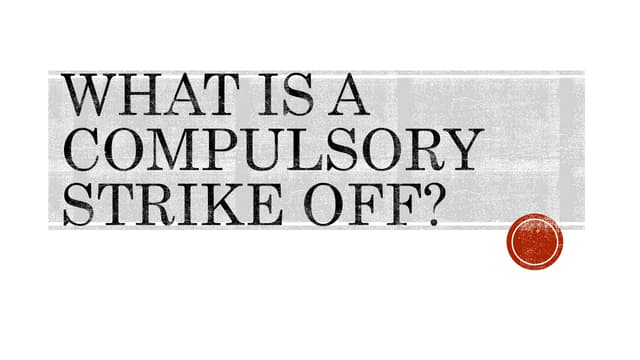Importance of the First Gazette Notice in Compulsory Strike Off
Importance of the First Gazette Notice in Compulsory Strike Off
Blog Article
Understanding the Refine and Effects of Compulsory Strike Off Under Firm Regulation
In the world of firm regulation, the procedure and ramifications of mandatory strike off hold substantial weight for businesses and their supervisors. Understanding the details of why business deal with such an outcome, the meticulous steps associated with the strike off process, and the significant implications for all events entailed is essential in navigating the facility landscape of company administration. As we look into the reasons behind compulsory strike offs, the occurring procedures, and the subsequent effects, a more clear photo arises of the profound influence it can have on people and entities alike.
Factors for Compulsory Strike Off
Compulsory strike off under firm legislation is initiated by the governing authorities for particular reasons connected to non-compliance or functional irregularities. The main factor for a company to face required strike off is the failure to file annual returns or economic declarations for a prolonged period. This non-compliance suggests a lack of openness and adherence to regulatory needs, raising concerns regarding the business's economic health and wellness and accountability.

Refine of Strike Off
Offered the regulatory authority's initiation of compulsory strike off for various factors, recognizing the process of strike off is vital for companies dealing with possible dissolution under company regulation. The procedure usually begins with the regulative authority sending out notices to the company's licensed workplace address, informing them of the approaching strike off. It is essential for the company to resolve any kind of outstanding issues, such as filing overdue papers or settling outstanding costs, within the specified duration to avoid dissolution.

Effects for Business
What are the implications for firms facing compulsory strike off under firm legislation? Business dealing with required strike off may run into numerous significant implications.
In addition, the company's properties at the time of strike off come to be building of the state, which can lead to monetary losses for financial institutions and investors. Shareholders may shed their financial investments, while financial institutions may have a hard time to recoup any arrearages owed to them by the struck-off business.
Furthermore, directors of the company might encounter incompetency from Bonuses holding similar positions in various other business for a specified period (compulsory strike off). This can stain their expert online reputation and restrict their future company opportunities
Consequences for Directors
Encountering obligatory strike off under firm regulation can have extreme implications for supervisors, affecting their future functions in other companies and potentially tarnishing their specialist standing. Supervisors of a firm dealing with obligatory strike off may find it challenging to safeguard directorial placements in various other business in the future. In general, the consequences of compulsory strike off for supervisors expand past the particular company in inquiry, influencing their occupation potential customers and professional reliability in the lengthy term.
Staying Clear Of Compulsory Strike Off

Final Thought
In conclusion, understanding the process and implications of mandatory strike off under company legislation is important for supervisors and firms to ensure compliance with laws. By being mindful of the reasons for strike off, the process entailed, and the repercussions for all events entailed, firms can take steps to prevent going through obligatory strike off. It is essential for supervisors to be positive in maintaining proper documents and conference legal responsibilities to stop the danger of strike off.
Given the regulatory authority's initiation of compulsory strike off for numerous factors, comprehending the process of strike off is essential for companies encountering prospective dissolution under business law.What are the implications for business dealing with compulsory strike off under firm regulation?Dealing with mandatory strike off under company regulation can have serious find this ramifications for supervisors, affecting their future roles in various other business and potentially staining their expert standing. Supervisors of a business facing required strike off might find it testing to secure directorial placements in various other companies in the future.In conclusion, comprehending the process and effects of mandatory strike off under company regulation is vital for companies and supervisors to ensure conformity with regulations.
Report this page